Marks and Spencer: Global Business Environment and Expansion Report
VerifiedAdded on 2020/10/05
|17
|5095
|183
Report
AI Summary
This report provides an executive summary on the global business environment, focusing on the impact of globalization on Marks and Spencer. It explores key factors driving globalization, such as cost, market dynamics, environmental considerations, competition, international economic integration, FDI, and digital technology. The report identifies strategic challenges for Marks and Spencer, including ethical business practices, international trade laws, and economic globalization. It applies the McKinsey 7S model to analyze organizational culture and the Hofstede model to assess cultural influences. The report also examines barriers to international business, offering recommendations for overcoming these challenges, and concludes with an overview of the global market influences and strategic implications for Marks and Spencer's expansion.
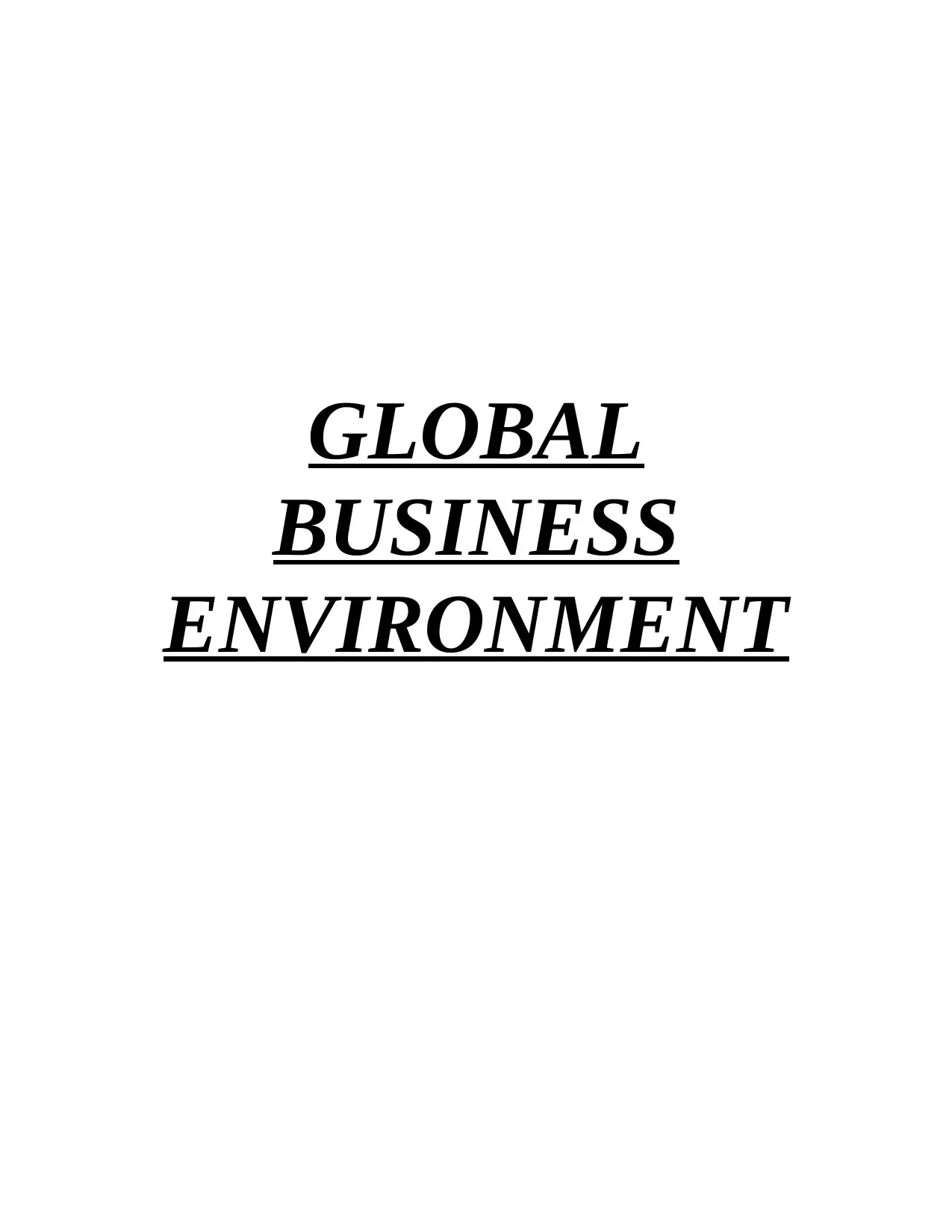
GLOBAL
BUSINESS
ENVIRONMENT
BUSINESS
ENVIRONMENT
Paraphrase This Document
Need a fresh take? Get an instant paraphrase of this document with our AI Paraphraser
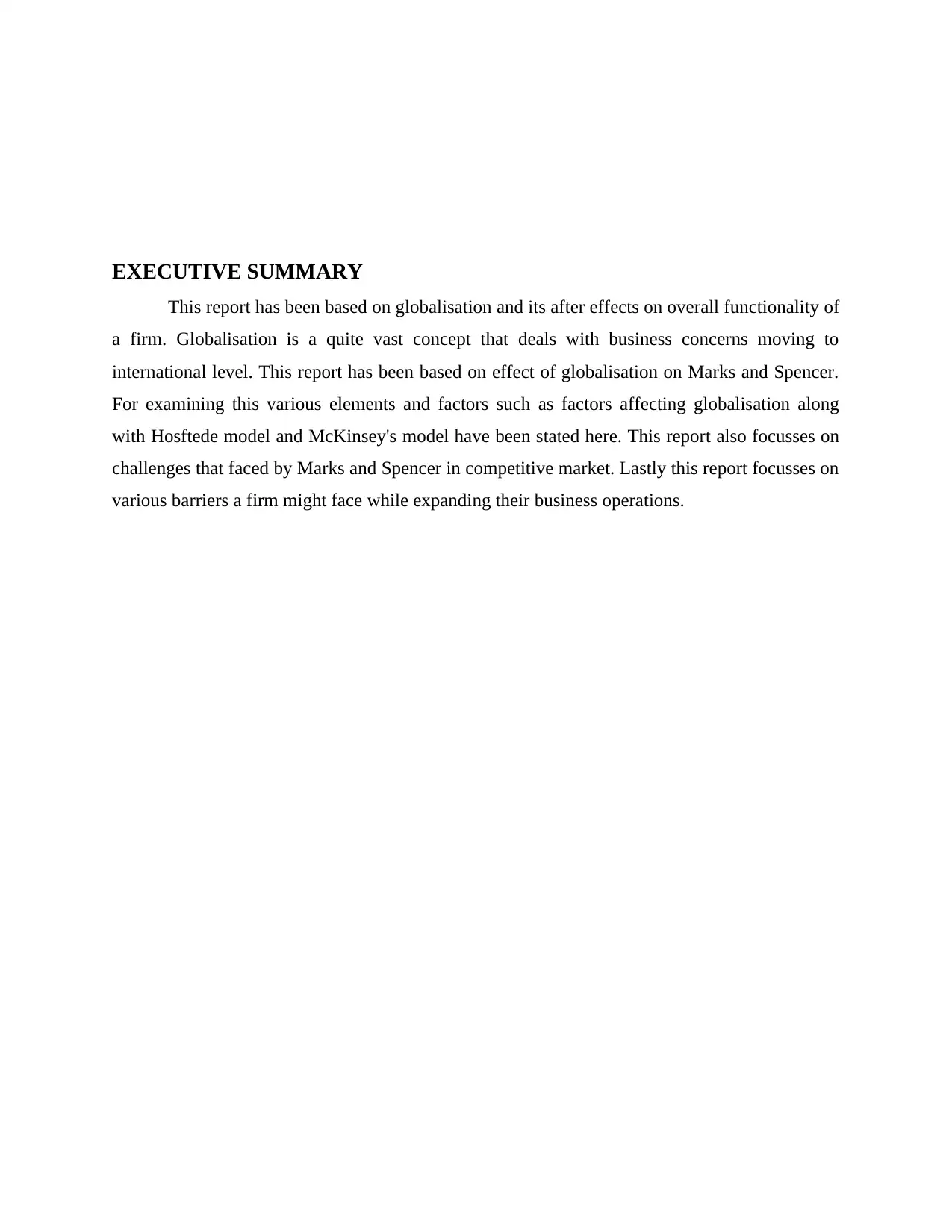
EXECUTIVE SUMMARY
This report has been based on globalisation and its after effects on overall functionality of
a firm. Globalisation is a quite vast concept that deals with business concerns moving to
international level. This report has been based on effect of globalisation on Marks and Spencer.
For examining this various elements and factors such as factors affecting globalisation along
with Hosftede model and McKinsey's model have been stated here. This report also focusses on
challenges that faced by Marks and Spencer in competitive market. Lastly this report focusses on
various barriers a firm might face while expanding their business operations.
This report has been based on globalisation and its after effects on overall functionality of
a firm. Globalisation is a quite vast concept that deals with business concerns moving to
international level. This report has been based on effect of globalisation on Marks and Spencer.
For examining this various elements and factors such as factors affecting globalisation along
with Hosftede model and McKinsey's model have been stated here. This report also focusses on
challenges that faced by Marks and Spencer in competitive market. Lastly this report focusses on
various barriers a firm might face while expanding their business operations.

⊘ This is a preview!⊘
Do you want full access?
Subscribe today to unlock all pages.

Trusted by 1+ million students worldwide
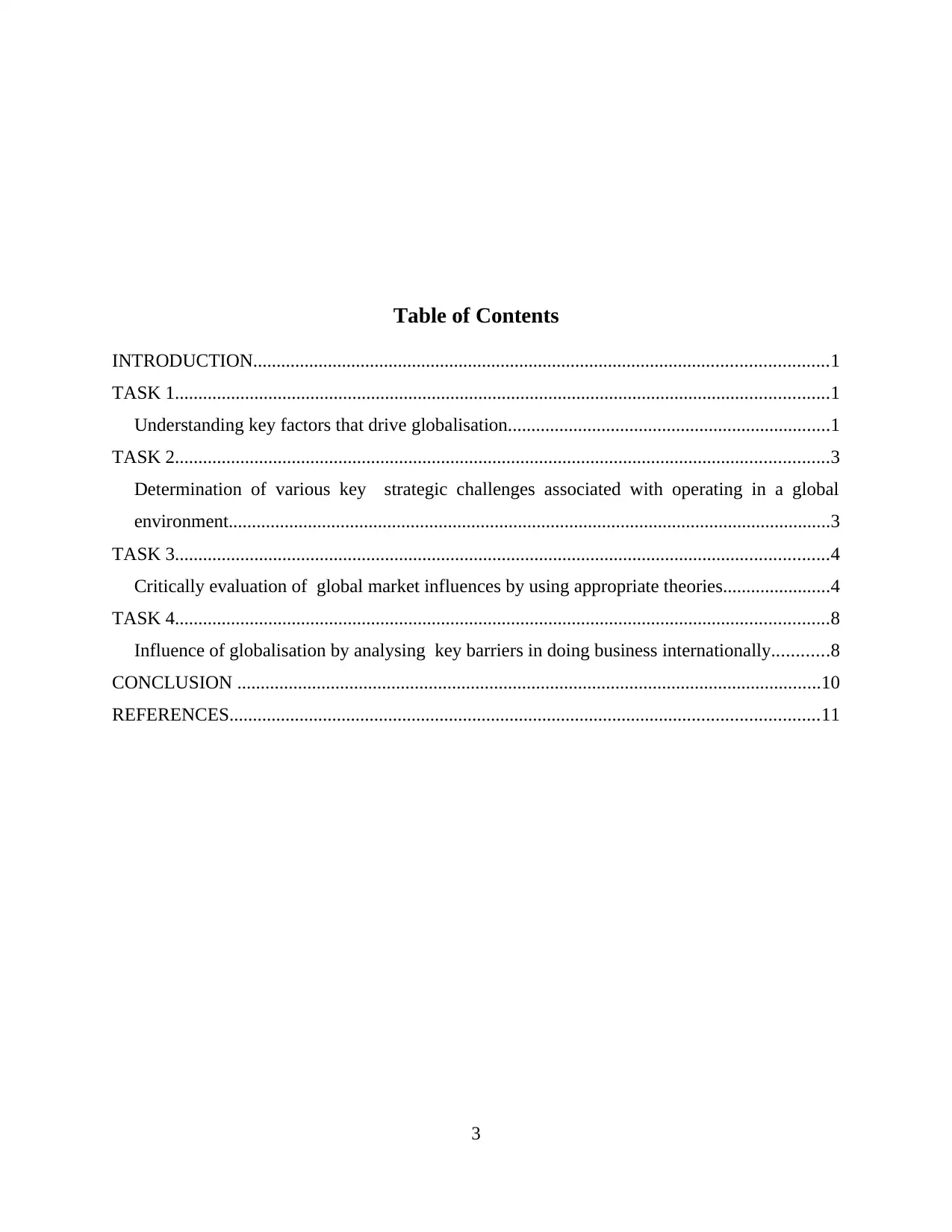
Table of Contents
INTRODUCTION...........................................................................................................................1
TASK 1............................................................................................................................................1
Understanding key factors that drive globalisation.....................................................................1
TASK 2............................................................................................................................................3
Determination of various key strategic challenges associated with operating in a global
environment.................................................................................................................................3
TASK 3............................................................................................................................................4
Critically evaluation of global market influences by using appropriate theories.......................4
TASK 4............................................................................................................................................8
Influence of globalisation by analysing key barriers in doing business internationally............8
CONCLUSION .............................................................................................................................10
REFERENCES..............................................................................................................................11
3
INTRODUCTION...........................................................................................................................1
TASK 1............................................................................................................................................1
Understanding key factors that drive globalisation.....................................................................1
TASK 2............................................................................................................................................3
Determination of various key strategic challenges associated with operating in a global
environment.................................................................................................................................3
TASK 3............................................................................................................................................4
Critically evaluation of global market influences by using appropriate theories.......................4
TASK 4............................................................................................................................................8
Influence of globalisation by analysing key barriers in doing business internationally............8
CONCLUSION .............................................................................................................................10
REFERENCES..............................................................................................................................11
3
Paraphrase This Document
Need a fresh take? Get an instant paraphrase of this document with our AI Paraphraser

INTRODUCTION
Business environment refers to a sum total of all internal as well as external factors that
affect functionality of business. It is an important aspect or factor which lays an impact on both
performance as well as long term sustainability of business whereas globalisation is an aspect
that focusses on bringing about a change or new innovations which is mainly used by business
concerns so as to expand their business as well as its overall functionality. It is quite useful in
serving needs and wants of customers thereby making them satisfied (Hamilton and Webster,
2018). Globalisation is a practice that is undertaken by almost all business entities for expanding
their business operations at global level. This report has been framed considering globalisation in
context of Marks and Spencer. It is a British multinational retail business concern with its
headquarters in Westminster, London. It basically deals in retail sector i.e. clothes and other
home accessories. This report throws light on various factors that affect globalisation such as
cost, environmental factors, market strategies etc. Also challenges faced by business concern
while expansion process has been stated as under. Lastly, this report also deals with critical
analysis of barriers which further affect business operations at international level.
TASK 1
Understanding key factors that drive globalisation.
Business growth and expansion is an important concept that enhances growth and
profitability of a business concern. In spite of various positive impacts of globalisation busibess
concerns have to many a times face certain critical situations which business concerns may have
to face. Globalisation affects business and its overall functionality in almost all sectors may it be
cultural, economic, political or social dimensions as well. For example, in respect of cultural
factors it can be seen that due to globalisation culture of various firms faced certain
modifications such as earlier people from all regions could not be employed in businesses but
now individuals from various regions can be hired. In relation to Marks and Spencer it has been
seen that the managers of M&S are assigned certain key duties such as identifying or analysing
impact of various key factors that affect functioning of business. Also they have to then
4
Business environment refers to a sum total of all internal as well as external factors that
affect functionality of business. It is an important aspect or factor which lays an impact on both
performance as well as long term sustainability of business whereas globalisation is an aspect
that focusses on bringing about a change or new innovations which is mainly used by business
concerns so as to expand their business as well as its overall functionality. It is quite useful in
serving needs and wants of customers thereby making them satisfied (Hamilton and Webster,
2018). Globalisation is a practice that is undertaken by almost all business entities for expanding
their business operations at global level. This report has been framed considering globalisation in
context of Marks and Spencer. It is a British multinational retail business concern with its
headquarters in Westminster, London. It basically deals in retail sector i.e. clothes and other
home accessories. This report throws light on various factors that affect globalisation such as
cost, environmental factors, market strategies etc. Also challenges faced by business concern
while expansion process has been stated as under. Lastly, this report also deals with critical
analysis of barriers which further affect business operations at international level.
TASK 1
Understanding key factors that drive globalisation.
Business growth and expansion is an important concept that enhances growth and
profitability of a business concern. In spite of various positive impacts of globalisation busibess
concerns have to many a times face certain critical situations which business concerns may have
to face. Globalisation affects business and its overall functionality in almost all sectors may it be
cultural, economic, political or social dimensions as well. For example, in respect of cultural
factors it can be seen that due to globalisation culture of various firms faced certain
modifications such as earlier people from all regions could not be employed in businesses but
now individuals from various regions can be hired. In relation to Marks and Spencer it has been
seen that the managers of M&S are assigned certain key duties such as identifying or analysing
impact of various key factors that affect functioning of business. Also they have to then
4
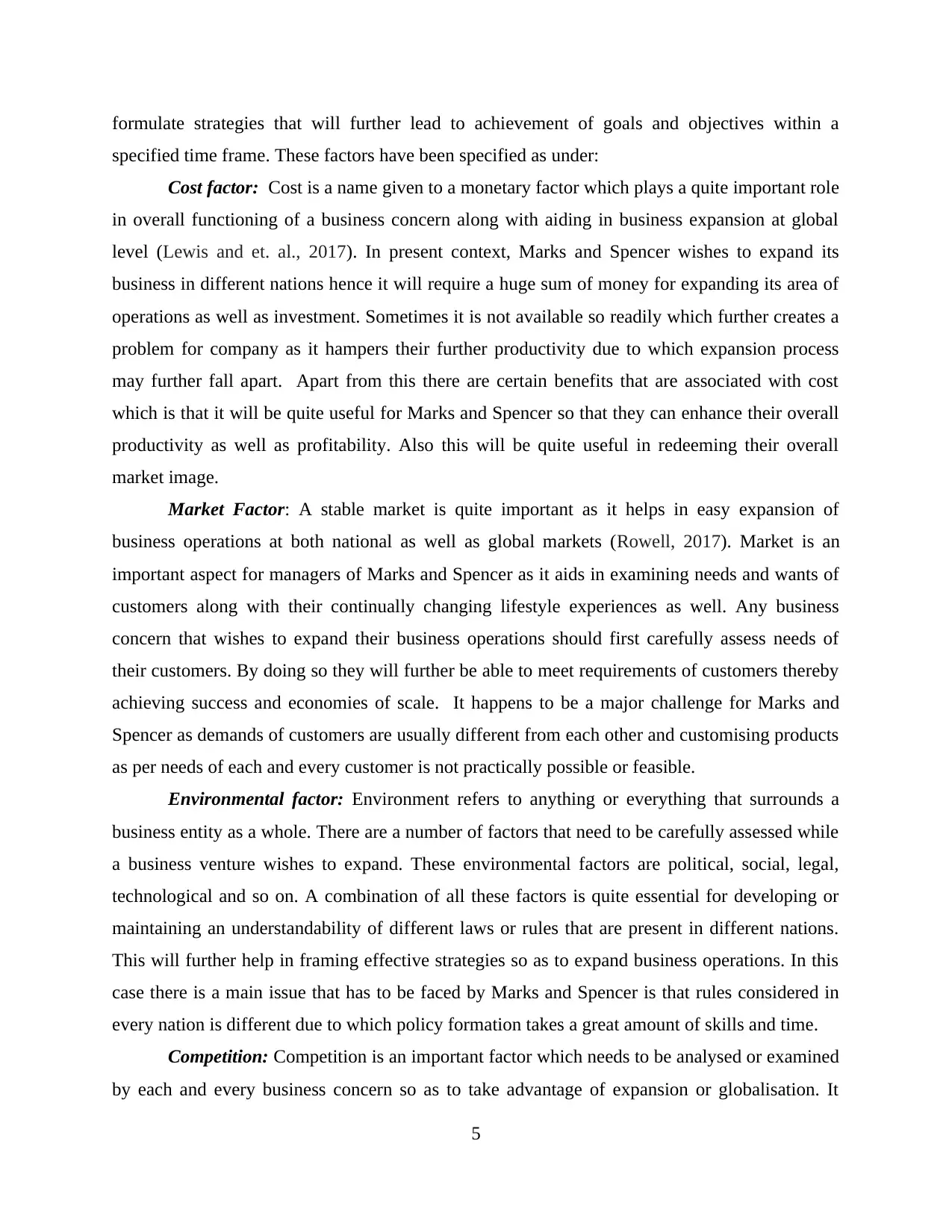
formulate strategies that will further lead to achievement of goals and objectives within a
specified time frame. These factors have been specified as under:
Cost factor: Cost is a name given to a monetary factor which plays a quite important role
in overall functioning of a business concern along with aiding in business expansion at global
level (Lewis and et. al., 2017). In present context, Marks and Spencer wishes to expand its
business in different nations hence it will require a huge sum of money for expanding its area of
operations as well as investment. Sometimes it is not available so readily which further creates a
problem for company as it hampers their further productivity due to which expansion process
may further fall apart. Apart from this there are certain benefits that are associated with cost
which is that it will be quite useful for Marks and Spencer so that they can enhance their overall
productivity as well as profitability. Also this will be quite useful in redeeming their overall
market image.
Market Factor: A stable market is quite important as it helps in easy expansion of
business operations at both national as well as global markets (Rowell, 2017). Market is an
important aspect for managers of Marks and Spencer as it aids in examining needs and wants of
customers along with their continually changing lifestyle experiences as well. Any business
concern that wishes to expand their business operations should first carefully assess needs of
their customers. By doing so they will further be able to meet requirements of customers thereby
achieving success and economies of scale. It happens to be a major challenge for Marks and
Spencer as demands of customers are usually different from each other and customising products
as per needs of each and every customer is not practically possible or feasible.
Environmental factor: Environment refers to anything or everything that surrounds a
business entity as a whole. There are a number of factors that need to be carefully assessed while
a business venture wishes to expand. These environmental factors are political, social, legal,
technological and so on. A combination of all these factors is quite essential for developing or
maintaining an understandability of different laws or rules that are present in different nations.
This will further help in framing effective strategies so as to expand business operations. In this
case there is a main issue that has to be faced by Marks and Spencer is that rules considered in
every nation is different due to which policy formation takes a great amount of skills and time.
Competition: Competition is an important factor which needs to be analysed or examined
by each and every business concern so as to take advantage of expansion or globalisation. It
5
specified time frame. These factors have been specified as under:
Cost factor: Cost is a name given to a monetary factor which plays a quite important role
in overall functioning of a business concern along with aiding in business expansion at global
level (Lewis and et. al., 2017). In present context, Marks and Spencer wishes to expand its
business in different nations hence it will require a huge sum of money for expanding its area of
operations as well as investment. Sometimes it is not available so readily which further creates a
problem for company as it hampers their further productivity due to which expansion process
may further fall apart. Apart from this there are certain benefits that are associated with cost
which is that it will be quite useful for Marks and Spencer so that they can enhance their overall
productivity as well as profitability. Also this will be quite useful in redeeming their overall
market image.
Market Factor: A stable market is quite important as it helps in easy expansion of
business operations at both national as well as global markets (Rowell, 2017). Market is an
important aspect for managers of Marks and Spencer as it aids in examining needs and wants of
customers along with their continually changing lifestyle experiences as well. Any business
concern that wishes to expand their business operations should first carefully assess needs of
their customers. By doing so they will further be able to meet requirements of customers thereby
achieving success and economies of scale. It happens to be a major challenge for Marks and
Spencer as demands of customers are usually different from each other and customising products
as per needs of each and every customer is not practically possible or feasible.
Environmental factor: Environment refers to anything or everything that surrounds a
business entity as a whole. There are a number of factors that need to be carefully assessed while
a business venture wishes to expand. These environmental factors are political, social, legal,
technological and so on. A combination of all these factors is quite essential for developing or
maintaining an understandability of different laws or rules that are present in different nations.
This will further help in framing effective strategies so as to expand business operations. In this
case there is a main issue that has to be faced by Marks and Spencer is that rules considered in
every nation is different due to which policy formation takes a great amount of skills and time.
Competition: Competition is an important factor which needs to be analysed or examined
by each and every business concern so as to take advantage of expansion or globalisation. It
5
⊘ This is a preview!⊘
Do you want full access?
Subscribe today to unlock all pages.

Trusted by 1+ million students worldwide

further proves to be an important tool which helps in strategy formulation as well as improving
overall quality of goods and services as well (Adekola and Sergi, 2016). In present context,
Marks and Spencer gains a number of benefits or advantages from competition prevailing in
market as it hands an entire spectrum or framework regarding goods and services so as to receive
benefits from customers. Also it will help in attracting a quite higher number of customers
towards its business providing a competitive edge over other rival firms.
International economic integration: Economic integration refers to an arrangement or
interconnection between various regions . This many a times includes reducing or removing any
sort of barriers that may be present while doing trade . Also it involves coordination among
various monetary as well as fiscal policies as well. In context of globalisation it can be said that
by practising economic integration many economies will start operating together and it will raise
high amount of funds thereby promoting growth and profitability.
Foreign direct investment: FDI or foreign direct investment is an important tool which
helps in promoting investment in a business. FDI is an investment tool by which any investor
from some other country. In this investor gains a certain amount of controlling authority over
business purchased. By practising foreign direct investments firms will be able to raise greater
funds and capital for their overall business operations. Only one demerit of this factor is that
controlling authority shifts to the investor.
Impact of digital technology on globalisation:
Adopting new and advanced technology will be quitew beneficial as it will help in raising
economies of scale for businesses. Also the market size in this context breaks into two
even parts.
Advancement in technology helps in reducing costs of transportations well as
communication from one nation to another.
TASK 2
Determination of various key strategic challenges associated with operating in a global
environment.
Performing business operations on a global level is a quite important aspect for business
concerns and has a certain amount of advantages as well. The two major advantages of operating
globally are effectiveness in meeting needs of customers along with enhancement in economies
6
overall quality of goods and services as well (Adekola and Sergi, 2016). In present context,
Marks and Spencer gains a number of benefits or advantages from competition prevailing in
market as it hands an entire spectrum or framework regarding goods and services so as to receive
benefits from customers. Also it will help in attracting a quite higher number of customers
towards its business providing a competitive edge over other rival firms.
International economic integration: Economic integration refers to an arrangement or
interconnection between various regions . This many a times includes reducing or removing any
sort of barriers that may be present while doing trade . Also it involves coordination among
various monetary as well as fiscal policies as well. In context of globalisation it can be said that
by practising economic integration many economies will start operating together and it will raise
high amount of funds thereby promoting growth and profitability.
Foreign direct investment: FDI or foreign direct investment is an important tool which
helps in promoting investment in a business. FDI is an investment tool by which any investor
from some other country. In this investor gains a certain amount of controlling authority over
business purchased. By practising foreign direct investments firms will be able to raise greater
funds and capital for their overall business operations. Only one demerit of this factor is that
controlling authority shifts to the investor.
Impact of digital technology on globalisation:
Adopting new and advanced technology will be quitew beneficial as it will help in raising
economies of scale for businesses. Also the market size in this context breaks into two
even parts.
Advancement in technology helps in reducing costs of transportations well as
communication from one nation to another.
TASK 2
Determination of various key strategic challenges associated with operating in a global
environment.
Performing business operations on a global level is a quite important aspect for business
concerns and has a certain amount of advantages as well. The two major advantages of operating
globally are effectiveness in meeting needs of customers along with enhancement in economies
6
Paraphrase This Document
Need a fresh take? Get an instant paraphrase of this document with our AI Paraphraser
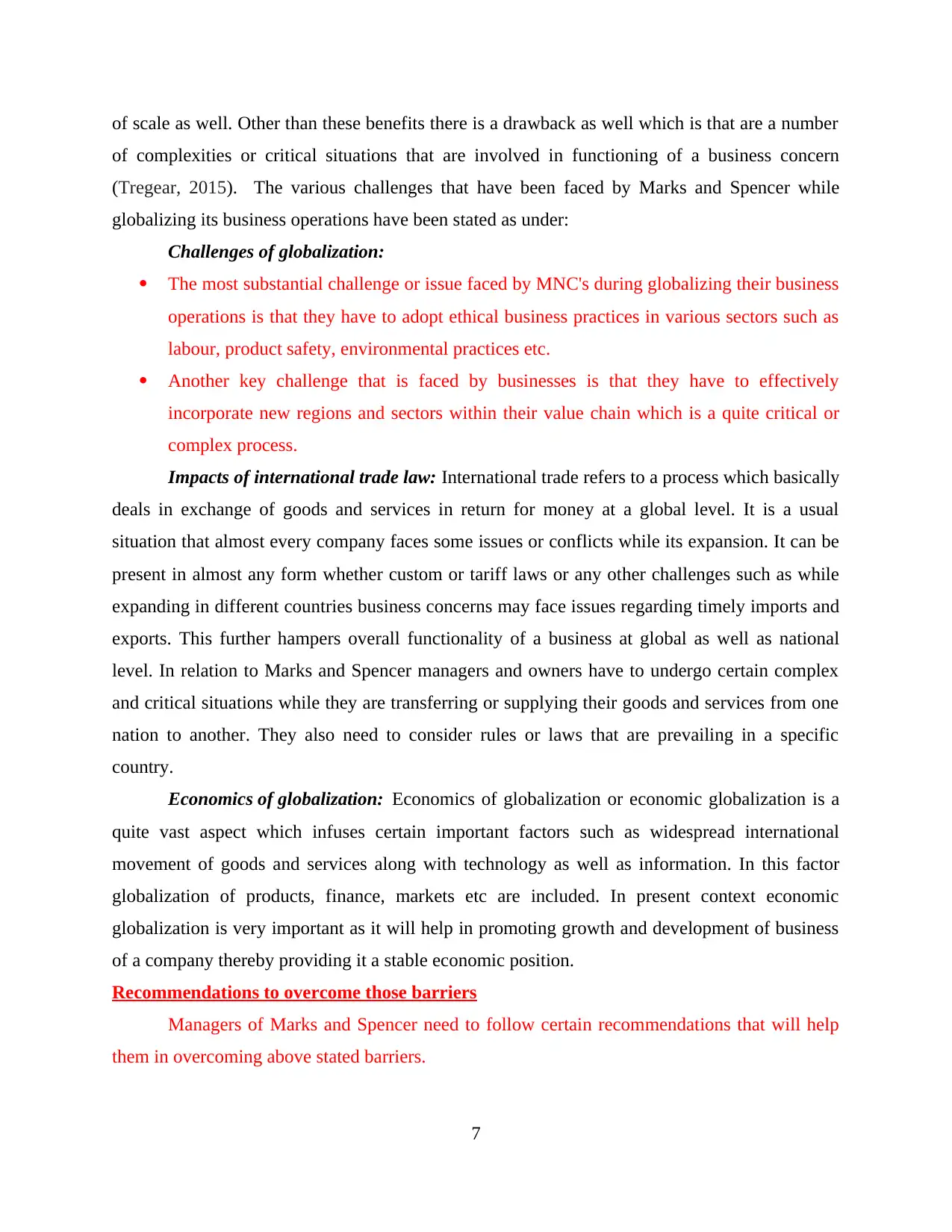
of scale as well. Other than these benefits there is a drawback as well which is that are a number
of complexities or critical situations that are involved in functioning of a business concern
(Tregear, 2015). The various challenges that have been faced by Marks and Spencer while
globalizing its business operations have been stated as under:
Challenges of globalization:
The most substantial challenge or issue faced by MNC's during globalizing their business
operations is that they have to adopt ethical business practices in various sectors such as
labour, product safety, environmental practices etc.
Another key challenge that is faced by businesses is that they have to effectively
incorporate new regions and sectors within their value chain which is a quite critical or
complex process.
Impacts of international trade law: International trade refers to a process which basically
deals in exchange of goods and services in return for money at a global level. It is a usual
situation that almost every company faces some issues or conflicts while its expansion. It can be
present in almost any form whether custom or tariff laws or any other challenges such as while
expanding in different countries business concerns may face issues regarding timely imports and
exports. This further hampers overall functionality of a business at global as well as national
level. In relation to Marks and Spencer managers and owners have to undergo certain complex
and critical situations while they are transferring or supplying their goods and services from one
nation to another. They also need to consider rules or laws that are prevailing in a specific
country.
Economics of globalization: Economics of globalization or economic globalization is a
quite vast aspect which infuses certain important factors such as widespread international
movement of goods and services along with technology as well as information. In this factor
globalization of products, finance, markets etc are included. In present context economic
globalization is very important as it will help in promoting growth and development of business
of a company thereby providing it a stable economic position.
Recommendations to overcome those barriers
Managers of Marks and Spencer need to follow certain recommendations that will help
them in overcoming above stated barriers.
7
of complexities or critical situations that are involved in functioning of a business concern
(Tregear, 2015). The various challenges that have been faced by Marks and Spencer while
globalizing its business operations have been stated as under:
Challenges of globalization:
The most substantial challenge or issue faced by MNC's during globalizing their business
operations is that they have to adopt ethical business practices in various sectors such as
labour, product safety, environmental practices etc.
Another key challenge that is faced by businesses is that they have to effectively
incorporate new regions and sectors within their value chain which is a quite critical or
complex process.
Impacts of international trade law: International trade refers to a process which basically
deals in exchange of goods and services in return for money at a global level. It is a usual
situation that almost every company faces some issues or conflicts while its expansion. It can be
present in almost any form whether custom or tariff laws or any other challenges such as while
expanding in different countries business concerns may face issues regarding timely imports and
exports. This further hampers overall functionality of a business at global as well as national
level. In relation to Marks and Spencer managers and owners have to undergo certain complex
and critical situations while they are transferring or supplying their goods and services from one
nation to another. They also need to consider rules or laws that are prevailing in a specific
country.
Economics of globalization: Economics of globalization or economic globalization is a
quite vast aspect which infuses certain important factors such as widespread international
movement of goods and services along with technology as well as information. In this factor
globalization of products, finance, markets etc are included. In present context economic
globalization is very important as it will help in promoting growth and development of business
of a company thereby providing it a stable economic position.
Recommendations to overcome those barriers
Managers of Marks and Spencer need to follow certain recommendations that will help
them in overcoming above stated barriers.
7

To achieve advantage against globalisation of business operations it is necessary that
managers of M&S evaluate culture of country it wishes to expand in. In respect of cost it
is suggested that cost associated within production and other functions should be
identified on prior basis. This will help in resolving any further issues.
For establishing value chain index it is necessary that managers of Marks and Spencer
examine market and their prevailing trends which will further help in raising overall
value chain index.
.
TASK 3
Critically evaluation of global market influences by using appropriate theories.
Globalisation broadly is a name given to a process where various economies of the world
are integrated or interconnected by a cross border method of trade between various nations. This
usually happens due to ample of reasons such as demands of consumers along with regularly
enhancing competition that is currently present in any country at a given point of time. This has
now become a global trend as business expansion further aids in achieving higher profitability
and productivity by considering needs of customers and effectively fulfilling them as well.
There are two theories which can be applied in this scenario. These theories have further been
stated as under:
Mckinsey's 7s model regarding culture of an organisations: It is an essential tool or
technique which is considered by managers of Marks and Spencer for examining organisational
design along with understandability regarding various elements such as structure, strategy,
systems, shared values, styles, skills, staff etc. This model proves useful for Marks and Spencer
in case they wish to analyse influence of global market further leading an enhancement in its
overall performance as well (McKinsey’s 7S Model. 2016). This is done by designing as well as
implementing effective strategies as well. Also there happens to be a global influence on
organisational structure as well as any company will have to frame strategies as per requirements
of market. This further helps Marks and Spencer's in achieving long term growth and sustainable
market position as well. This model comprises of a number of factors which can further be
classified into two categories namely hard elements and soft elements.
8
managers of M&S evaluate culture of country it wishes to expand in. In respect of cost it
is suggested that cost associated within production and other functions should be
identified on prior basis. This will help in resolving any further issues.
For establishing value chain index it is necessary that managers of Marks and Spencer
examine market and their prevailing trends which will further help in raising overall
value chain index.
.
TASK 3
Critically evaluation of global market influences by using appropriate theories.
Globalisation broadly is a name given to a process where various economies of the world
are integrated or interconnected by a cross border method of trade between various nations. This
usually happens due to ample of reasons such as demands of consumers along with regularly
enhancing competition that is currently present in any country at a given point of time. This has
now become a global trend as business expansion further aids in achieving higher profitability
and productivity by considering needs of customers and effectively fulfilling them as well.
There are two theories which can be applied in this scenario. These theories have further been
stated as under:
Mckinsey's 7s model regarding culture of an organisations: It is an essential tool or
technique which is considered by managers of Marks and Spencer for examining organisational
design along with understandability regarding various elements such as structure, strategy,
systems, shared values, styles, skills, staff etc. This model proves useful for Marks and Spencer
in case they wish to analyse influence of global market further leading an enhancement in its
overall performance as well (McKinsey’s 7S Model. 2016). This is done by designing as well as
implementing effective strategies as well. Also there happens to be a global influence on
organisational structure as well as any company will have to frame strategies as per requirements
of market. This further helps Marks and Spencer's in achieving long term growth and sustainable
market position as well. This model comprises of a number of factors which can further be
classified into two categories namely hard elements and soft elements.
8
⊘ This is a preview!⊘
Do you want full access?
Subscribe today to unlock all pages.

Trusted by 1+ million students worldwide

Hard elements: Elements or factors that can be easily determined and defined fall under
name of hard elements. Various factors infused in hard elements are organisational strategies,
systems and structure of company as well.
Soft elements: Elements or factors that are intangible in nature and are complex to define
come under this category. These elements tend to be influenced or affected by culture of an
organisation such as skills, styles, values etc (Caiazza, Shimizu and Yoshikawa, 2017).
McKinsey model has further been stated as under:
Hard Elements:
Strategy: Strategies of a business refers to plans or guidelines that are generally
constructed so as to maintain or build a competitive edge. Strategy implementation is a process
and should be done in a formal way as per market conditions of a country. This further helps in
effective performance of a business concern at a global level. Also there happens to be a quite
higher market influence hence they need to be constructed as per environmental problems and
customer's demands (Cavusgil and Knight, 2015). Marks and Spencer operates with an
innovative approach in its strategies which further help in reducing its overall market influence.
illustration 1: MC Kinsey 7s model, 2016
Structure: In context of this element, organisational structure of Marks and Spencer is
such that company functions and revolves around their production units. Marks and Spencer in
present context operates in a number of countries while their headquarters are situated in
9
name of hard elements. Various factors infused in hard elements are organisational strategies,
systems and structure of company as well.
Soft elements: Elements or factors that are intangible in nature and are complex to define
come under this category. These elements tend to be influenced or affected by culture of an
organisation such as skills, styles, values etc (Caiazza, Shimizu and Yoshikawa, 2017).
McKinsey model has further been stated as under:
Hard Elements:
Strategy: Strategies of a business refers to plans or guidelines that are generally
constructed so as to maintain or build a competitive edge. Strategy implementation is a process
and should be done in a formal way as per market conditions of a country. This further helps in
effective performance of a business concern at a global level. Also there happens to be a quite
higher market influence hence they need to be constructed as per environmental problems and
customer's demands (Cavusgil and Knight, 2015). Marks and Spencer operates with an
innovative approach in its strategies which further help in reducing its overall market influence.
illustration 1: MC Kinsey 7s model, 2016
Structure: In context of this element, organisational structure of Marks and Spencer is
such that company functions and revolves around their production units. Marks and Spencer in
present context operates in a number of countries while their headquarters are situated in
9
Paraphrase This Document
Need a fresh take? Get an instant paraphrase of this document with our AI Paraphraser
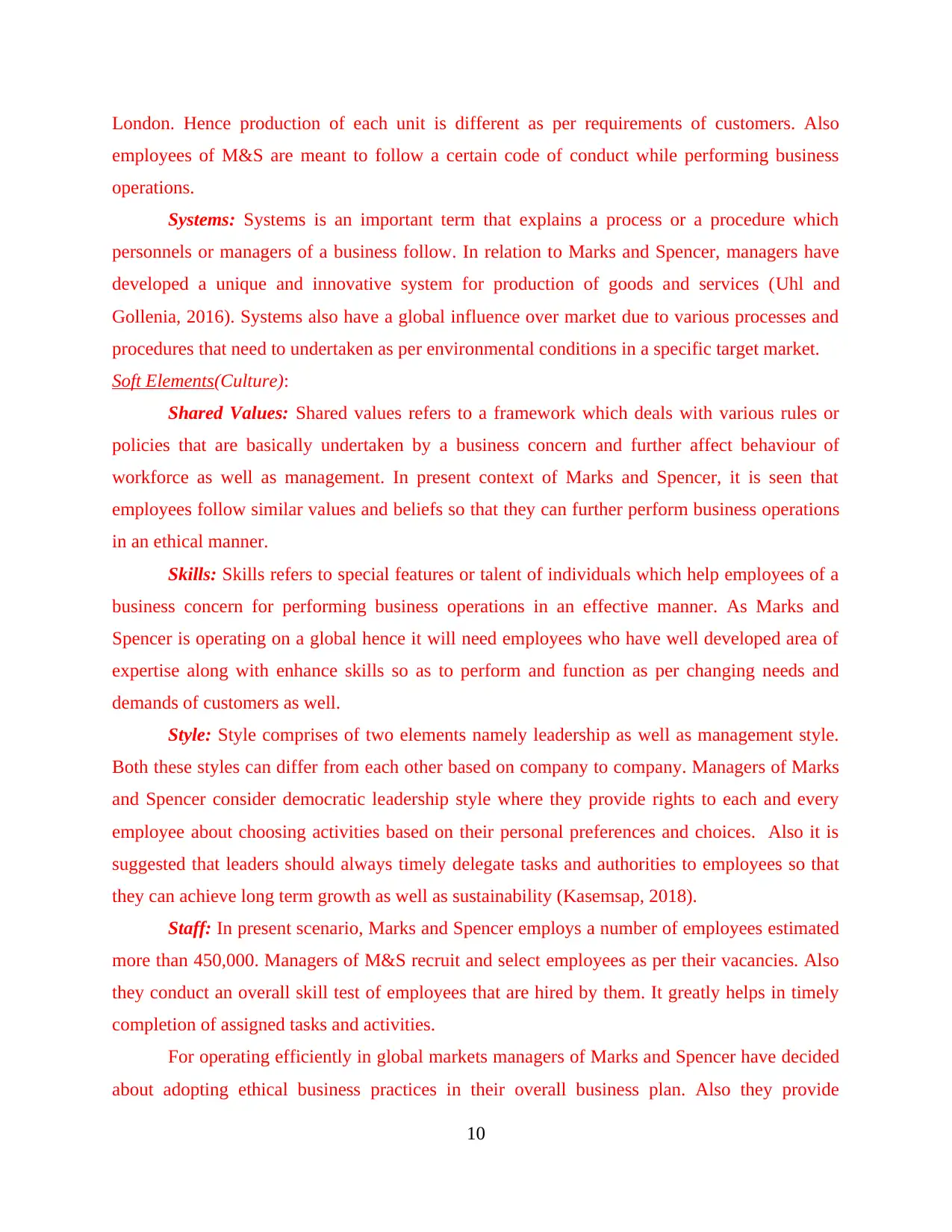
London. Hence production of each unit is different as per requirements of customers. Also
employees of M&S are meant to follow a certain code of conduct while performing business
operations.
Systems: Systems is an important term that explains a process or a procedure which
personnels or managers of a business follow. In relation to Marks and Spencer, managers have
developed a unique and innovative system for production of goods and services (Uhl and
Gollenia, 2016). Systems also have a global influence over market due to various processes and
procedures that need to undertaken as per environmental conditions in a specific target market.
Soft Elements(Culture):
Shared Values: Shared values refers to a framework which deals with various rules or
policies that are basically undertaken by a business concern and further affect behaviour of
workforce as well as management. In present context of Marks and Spencer, it is seen that
employees follow similar values and beliefs so that they can further perform business operations
in an ethical manner.
Skills: Skills refers to special features or talent of individuals which help employees of a
business concern for performing business operations in an effective manner. As Marks and
Spencer is operating on a global hence it will need employees who have well developed area of
expertise along with enhance skills so as to perform and function as per changing needs and
demands of customers as well.
Style: Style comprises of two elements namely leadership as well as management style.
Both these styles can differ from each other based on company to company. Managers of Marks
and Spencer consider democratic leadership style where they provide rights to each and every
employee about choosing activities based on their personal preferences and choices. Also it is
suggested that leaders should always timely delegate tasks and authorities to employees so that
they can achieve long term growth as well as sustainability (Kasemsap, 2018).
Staff: In present scenario, Marks and Spencer employs a number of employees estimated
more than 450,000. Managers of M&S recruit and select employees as per their vacancies. Also
they conduct an overall skill test of employees that are hired by them. It greatly helps in timely
completion of assigned tasks and activities.
For operating efficiently in global markets managers of Marks and Spencer have decided
about adopting ethical business practices in their overall business plan. Also they provide
10
employees of M&S are meant to follow a certain code of conduct while performing business
operations.
Systems: Systems is an important term that explains a process or a procedure which
personnels or managers of a business follow. In relation to Marks and Spencer, managers have
developed a unique and innovative system for production of goods and services (Uhl and
Gollenia, 2016). Systems also have a global influence over market due to various processes and
procedures that need to undertaken as per environmental conditions in a specific target market.
Soft Elements(Culture):
Shared Values: Shared values refers to a framework which deals with various rules or
policies that are basically undertaken by a business concern and further affect behaviour of
workforce as well as management. In present context of Marks and Spencer, it is seen that
employees follow similar values and beliefs so that they can further perform business operations
in an ethical manner.
Skills: Skills refers to special features or talent of individuals which help employees of a
business concern for performing business operations in an effective manner. As Marks and
Spencer is operating on a global hence it will need employees who have well developed area of
expertise along with enhance skills so as to perform and function as per changing needs and
demands of customers as well.
Style: Style comprises of two elements namely leadership as well as management style.
Both these styles can differ from each other based on company to company. Managers of Marks
and Spencer consider democratic leadership style where they provide rights to each and every
employee about choosing activities based on their personal preferences and choices. Also it is
suggested that leaders should always timely delegate tasks and authorities to employees so that
they can achieve long term growth as well as sustainability (Kasemsap, 2018).
Staff: In present scenario, Marks and Spencer employs a number of employees estimated
more than 450,000. Managers of M&S recruit and select employees as per their vacancies. Also
they conduct an overall skill test of employees that are hired by them. It greatly helps in timely
completion of assigned tasks and activities.
For operating efficiently in global markets managers of Marks and Spencer have decided
about adopting ethical business practices in their overall business plan. Also they provide
10
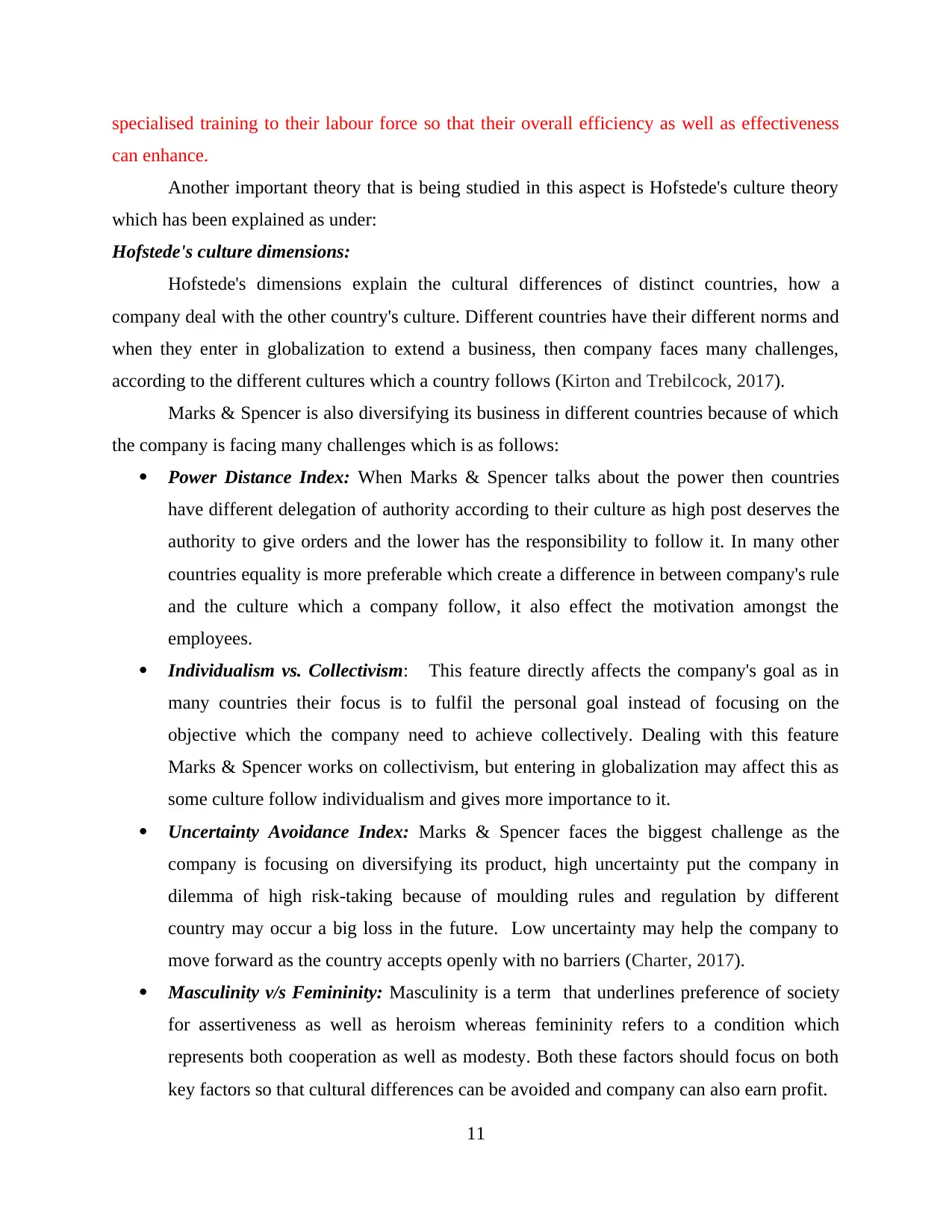
specialised training to their labour force so that their overall efficiency as well as effectiveness
can enhance.
Another important theory that is being studied in this aspect is Hofstede's culture theory
which has been explained as under:
Hofstede's culture dimensions:
Hofstede's dimensions explain the cultural differences of distinct countries, how a
company deal with the other country's culture. Different countries have their different norms and
when they enter in globalization to extend a business, then company faces many challenges,
according to the different cultures which a country follows (Kirton and Trebilcock, 2017).
Marks & Spencer is also diversifying its business in different countries because of which
the company is facing many challenges which is as follows:
Power Distance Index: When Marks & Spencer talks about the power then countries
have different delegation of authority according to their culture as high post deserves the
authority to give orders and the lower has the responsibility to follow it. In many other
countries equality is more preferable which create a difference in between company's rule
and the culture which a company follow, it also effect the motivation amongst the
employees.
Individualism vs. Collectivism: This feature directly affects the company's goal as in
many countries their focus is to fulfil the personal goal instead of focusing on the
objective which the company need to achieve collectively. Dealing with this feature
Marks & Spencer works on collectivism, but entering in globalization may affect this as
some culture follow individualism and gives more importance to it.
Uncertainty Avoidance Index: Marks & Spencer faces the biggest challenge as the
company is focusing on diversifying its product, high uncertainty put the company in
dilemma of high risk-taking because of moulding rules and regulation by different
country may occur a big loss in the future. Low uncertainty may help the company to
move forward as the country accepts openly with no barriers (Charter, 2017).
Masculinity v/s Femininity: Masculinity is a term that underlines preference of society
for assertiveness as well as heroism whereas femininity refers to a condition which
represents both cooperation as well as modesty. Both these factors should focus on both
key factors so that cultural differences can be avoided and company can also earn profit.
11
can enhance.
Another important theory that is being studied in this aspect is Hofstede's culture theory
which has been explained as under:
Hofstede's culture dimensions:
Hofstede's dimensions explain the cultural differences of distinct countries, how a
company deal with the other country's culture. Different countries have their different norms and
when they enter in globalization to extend a business, then company faces many challenges,
according to the different cultures which a country follows (Kirton and Trebilcock, 2017).
Marks & Spencer is also diversifying its business in different countries because of which
the company is facing many challenges which is as follows:
Power Distance Index: When Marks & Spencer talks about the power then countries
have different delegation of authority according to their culture as high post deserves the
authority to give orders and the lower has the responsibility to follow it. In many other
countries equality is more preferable which create a difference in between company's rule
and the culture which a company follow, it also effect the motivation amongst the
employees.
Individualism vs. Collectivism: This feature directly affects the company's goal as in
many countries their focus is to fulfil the personal goal instead of focusing on the
objective which the company need to achieve collectively. Dealing with this feature
Marks & Spencer works on collectivism, but entering in globalization may affect this as
some culture follow individualism and gives more importance to it.
Uncertainty Avoidance Index: Marks & Spencer faces the biggest challenge as the
company is focusing on diversifying its product, high uncertainty put the company in
dilemma of high risk-taking because of moulding rules and regulation by different
country may occur a big loss in the future. Low uncertainty may help the company to
move forward as the country accepts openly with no barriers (Charter, 2017).
Masculinity v/s Femininity: Masculinity is a term that underlines preference of society
for assertiveness as well as heroism whereas femininity refers to a condition which
represents both cooperation as well as modesty. Both these factors should focus on both
key factors so that cultural differences can be avoided and company can also earn profit.
11
⊘ This is a preview!⊘
Do you want full access?
Subscribe today to unlock all pages.

Trusted by 1+ million students worldwide
1 out of 17
Related Documents
Your All-in-One AI-Powered Toolkit for Academic Success.
+13062052269
info@desklib.com
Available 24*7 on WhatsApp / Email
![[object Object]](/_next/static/media/star-bottom.7253800d.svg)
Unlock your academic potential
Copyright © 2020–2026 A2Z Services. All Rights Reserved. Developed and managed by ZUCOL.





